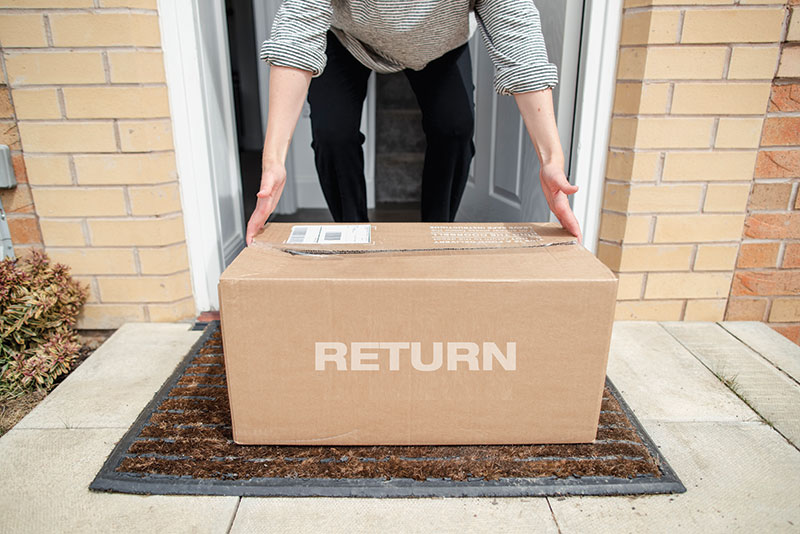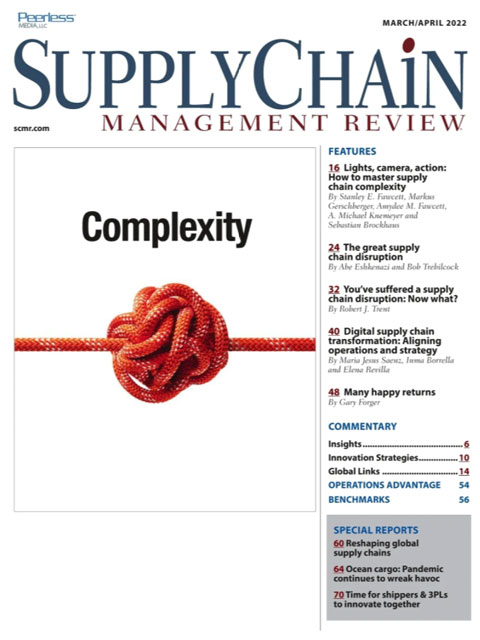Sorry, but your login has failed. Please recheck your login information and resubmit. If your subscription has expired, renew here.
March-April 2022
Yesterday, I hosted a webinar on the steps supply chain leaders are taking to redesign their supply chains to cope with this period of unprecedented demand. Earlier last month, I attended the Manifest conference in Las Vegas. The exhibitors featured a lineup of supply chain startups while the attendee list was dominated by venture capital firms looking to get in on the action in our booming industry. This morning, one of the lead news stories is about another disruption threatening to bring global supply chains to a halt: Browse this issue archive.Need Help? Contact customer service 847-559-7581 More options
We’re all familiar with the saying “may you live in interesting times.” Depending on when it’s said, the proverb can be interpreted as either a blessing or a curse.
There’s also the proverb—many happy returns. It’s usually intended to wish someone a long string of future birthdays. However, many happy returns is now emerging as the proverbial blessing and a curse in the supply chain.
“Most companies look at returns as a necessary evil (curse) and don’t treat them much better than you might expect,” says Nick Vyas of the Marshall School of Business at the University of Southern California. But he insists that returns deserve more respect than that. In fact, returns and returns policies are actually an open door to ever higher sales and profits (blessing), especially in e-commerce. At USC, Vyas is the Kendrick executive director of the Global Supply Chain Management Institute and associate professor of clinical/data science and operations.
Yes, we do live in interesting times.
The returns profile
Given the dislike many in the supply chain have for returns, there should probably be a scapegoat for making them acceptable in the first place. Some give that honor to Zappos, the e-commerce shoe merchant that has been a part of Amazon since 2009.
From its start 10 years earlier, Zappos worked hard to eliminate any stigma to returning its shoes. In fact, the company encouraged customers to order an array of shoes and send back, for free, whatever didn’t fit or the customer didn’t like for whatever reason, no questions asked. It was just a necessary part of e-commerce transactions.

This complete article is available to subscribers only.
Log in now for full access or start your PLUS+ subscription for instant access.
SC
MR
Sorry, but your login has failed. Please recheck your login information and resubmit. If your subscription has expired, renew here.
March-April 2022
Yesterday, I hosted a webinar on the steps supply chain leaders are taking to redesign their supply chains to cope with this period of unprecedented demand. Earlier last month, I attended the Manifest conference in… Browse this issue archive. Access your online digital edition. Download a PDF file of the March-April 2022 issue.We’re all familiar with the saying “may you live in interesting times.” Depending on when it’s said, the proverb can be interpreted as either a blessing or a curse.
There’s also the proverb—many happy returns. It’s usually intended to wish someone a long string of future birthdays. However, many happy returns is now emerging as the proverbial blessing and a curse in the supply chain.
“Most companies look at returns as a necessary evil (curse) and don’t treat them much better than you might expect,” says Nick Vyas of the Marshall School of Business at the University of Southern California. But he insists that returns deserve more respect than that. In fact, returns and returns policies are actually an open door to ever higher sales and profits (blessing), especially in e-commerce. At USC, Vyas is the Kendrick executive director of the Global Supply Chain Management Institute and associate professor of clinical/data science and operations.
Yes, we do live in interesting times.
The returns profile
Given the dislike many in the supply chain have for returns, there should probably be a scapegoat for making them acceptable in the first place. Some give that honor to Zappos, the e-commerce shoe merchant that has been a part of Amazon since 2009.
From its start 10 years earlier, Zappos worked hard to eliminate any stigma to returning its shoes. In fact, the company encouraged customers to order an array of shoes and send back, for free, whatever didn’t fit or the customer didn’t like for whatever reason, no questions asked. It was just a necessary part of e-commerce transactions.
SC
MR


More 3PL
- Services sector sees growth in October, reports ISM
- Managing inbound freight: What has changed in two decades?
- Inbound freight: Often a missed opportunity
- 2024 Warehouse/DC Operations Survey: Technology adoption on the rise
- Looking back at NextGen 2024
- Manufacturing again contracts in October, reports ISM
- More 3PL
Latest Podcast

 Explore
Explore
Topics
Business Management News
- Strengthening customer fulfillment: Building a strategic stakeholder network
- The hard job of teaching soft skills
- Trump picks former Wisconsin congressman Sean Duffy for DOT secretary
- Made in Mexico, manufactured by China
- Retail sales see gains in October, reports Commerce and NRF
- Balancing green and speed: Home delivery insights from the pandemic era
- More Business Management
Latest Business Management Resources

Subscribe

Supply Chain Management Review delivers the best industry content.

Editors’ Picks






